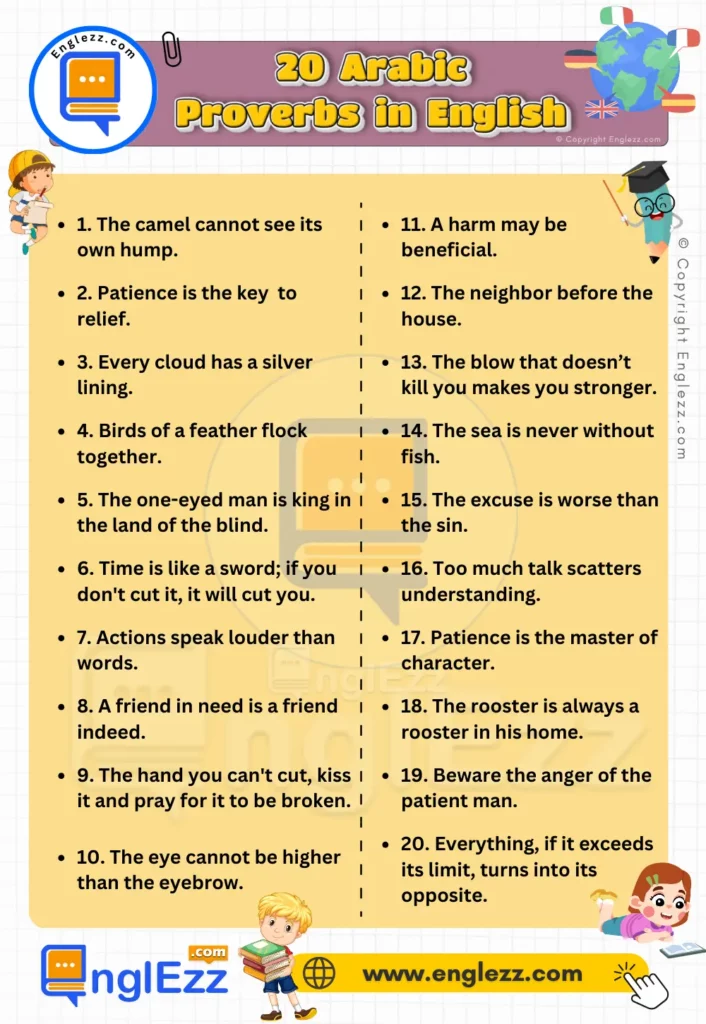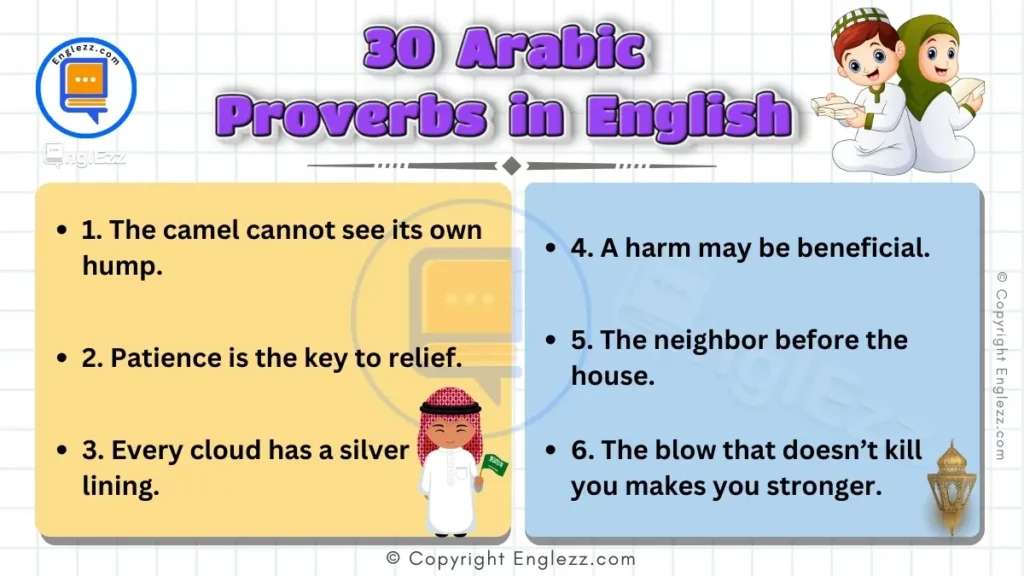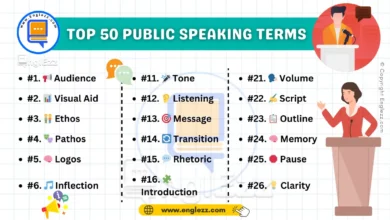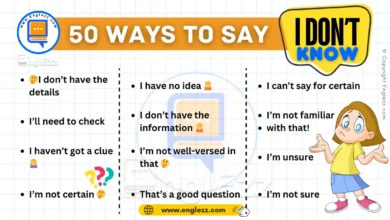Arabic proverbs serve as a window into the rich cultural heritage of the Arab world, encapsulating centuries of wisdom, tradition, and life lessons. In this blog post, we’ll explore 30 timeless Arabic proverbs in English, each accompanied by its translation, phonetic transcription, and a detailed explanation. We’ll also provide two examples for each proverb to illustrate how they can be used in everyday conversation.
These proverbs are concise, often poetic expressions that convey universal truths and practical advice on how to navigate life’s challenges. Whether you’re learning Arabic or simply interested in cultural expressions, understanding these proverbs can provide deep insights into the values and beliefs of Arabic-speaking communities.
30 Insightful Arabic Proverbs In English with Examples
By familiarizing yourself with these proverbs, you’ll not only enhance your language skills but also gain a deeper appreciation for the wisdom embedded in Arabic culture. This guide is perfect for students, educators, and anyone looking to enrich their understanding of Arabic language and culture. Additionally, we’ve included valuable resources from Englezz to support your language learning journey.
#1. 🧠 “الكتاب يُعرف من عنوانه”
Phonetic Transcription: Al-kitab yu‘raf min ‘unwanihi
English Translation: The book is known by its title.
Explanation: This proverb suggests that the nature of something can often be inferred from its outward appearance or title. It is similar to the English saying, “Don’t judge a book by its cover,” but with a focus on the title.
Example 1: Before reading the article, I guessed its content based on the title.
Example 2: The movie’s title gave me a good idea of its theme.
#2. 🧠 “من جد وجد”
Phonetic Transcription: Man jadda wajada
English Translation: He who strives, finds.
Explanation: This proverb emphasizes the importance of effort and persistence in achieving success. It suggests that those who work hard will eventually achieve their goals.
Example 1: After months of preparation, I passed the exam, proving that man jadda wajada.
Example 2: Success in business often comes to those who are willing to put in the effort.
#3. 🧠 “الحاجة أم الاختراع”
Phonetic Transcription: Al-haja umm al-ikhtira‘
English Translation: Necessity is the mother of invention.
Explanation: This proverb means that challenges and needs inspire creativity and innovation. When faced with a problem, people often find ingenious ways to solve it.
Example 1: When our power went out, we cooked using a makeshift stove, proving al-haja umm al-ikhtira‘.
Example 2: Many modern inventions were born out of necessity.
#4. 🧠 “الوقت كالسيف إن لم تقطعه قطعك”
Phonetic Transcription: Al-waqt ka al-saif in lam taqtahu qata‘ak
English Translation: Time is like a sword; if you don’t cut it, it will cut you.
Explanation: This proverb underscores the importance of managing time effectively. If you don’t take control of your time, it can work against you.
Example 1: Procrastination can be dangerous; remember that al-waqt ka al-saif.
Example 2: Managing your time well is essential to success.
#5. 🧠 “الصديق وقت الضيق”
Phonetic Transcription: Al-sadiq waqt al-dhiq
English Translation: A friend in need is a friend indeed.
Explanation: This proverb highlights the importance of true friendship, particularly during difficult times.
Example 1: When I was struggling, my friend helped me, showing that al-sadiq waqt al-dhiq.
Example 2: You can identify true friends by who stands by you in tough times.
#6. 🧠 “من أمنك لا تخونه”
Phonetic Transcription: Man amanka la takhunuh
English Translation: He who trusts you, do not betray him.
Explanation: This proverb advises against betraying someone who has placed their trust in you, emphasizing the importance of loyalty and integrity.
Example 1: My boss trusted me with confidential information, and I ensured it stayed secure.
Example 2: A friend’s trust is valuable; never betray it.

#7. 🧠 “العقل زينة”
Phonetic Transcription: Al-‘aql zina
English Translation: The mind is an ornament.
Explanation: This proverb means that intelligence and wisdom are the most valuable assets a person can possess.
Example 1: My grandmother always said that al-‘aql zina is more important than wealth.
Example 2: Education enriches the mind, making it a true ornament.
#8. 🧠 “رب أخ لك لم تلده أمك”
Phonetic Transcription: Rubb akh lak lam talidhu ummak
English Translation: A brother may not be born of your mother.
Explanation: This proverb means that strong bonds of friendship can be just as important as blood relations.
Example 1: My best friend is like a brother to me, though we’re not related by blood.
Example 2: Rubb akh lak reminds us that family isn’t just about blood ties.
#9. 🧠 “الوقاية خير من العلاج”
Phonetic Transcription: Al-wiqaya khayrun min al-‘ilaj
English Translation: Prevention is better than cure.
Explanation: This proverb emphasizes the importance of taking precautions to avoid problems rather than dealing with their consequences.
Example 1: Regular exercise and a healthy diet are essential because al-wiqaya khayrun min al-‘ilaj.
Example 2: It’s better to avoid risks than to deal with the fallout.
#10. 🧠 “البعيد عن العين بعيد عن القلب”
Phonetic Transcription: Al-baeed an al-ain baeed an al-qalb
English Translation: Out of sight, out of mind.
Explanation: This proverb suggests that when someone or something is not physically present, it’s easy to forget about them or it.
Example 1: We grew apart after I moved away, as al-baeed an al-ain baeed an al-qalb.
Example 2: If you don’t see someone regularly, you may not think about them as much.
#11. 🧠 “اتق شر من أحسنت إليه”
Phonetic Transcription: Ittaqqi sharra man ahsanta ilayh
English Translation: Beware of the evil of those you’ve been kind to.
Explanation: This proverb warns that sometimes, those who receive kindness may repay it with harm.
Example 1: After helping him, he tried to take advantage of me—it shows Ittaqqi sharra man ahsanta ilayh.
Example 2: Be careful when being too generous; it can backfire.
#12. 🧠 “يد واحدة لا تصفق”
Phonetic Transcription: Yad wahida la tusaffiq
English Translation: One hand cannot clap.
Explanation: This proverb emphasizes the importance of cooperation and teamwork. Success often requires the combined efforts of multiple people.
Example 1: The project was successful because we worked together—yad wahida la tusaffiq.
Example 2: Achieving goals often requires the support of others.
#13. 🧠 “على قد لحافك مد رجليك”
Phonetic Transcription: ‘Ala qadd lihafak mudd rijlayk
English Translation: Stretch your legs according to your cover.
Explanation: This proverb advises living within one’s means and not overextending oneself financially or otherwise.
Example 1: I chose a modest car because ‘ala qadd lihafak mudd rijlayk.
Example 2: It’s wise to spend within your limits to avoid debt.
#14. 🧠 “الحكمة ضالة المؤمن”
Phonetic Transcription: Al-hikma dalat al-mu’min
English Translation: Wisdom is the lost property of the believer.
Explanation: This proverb suggests that wisdom is valuable and should be sought after, regardless of where it is found.
Example 1: I always seek advice from different sources because al-hikma dalat al-mu’min.
Example 2: Wisdom can come from unexpected places; it’s worth seeking.
#15. 🧠 “إذا ضربت فأوجع”
Phonetic Transcription: Idha darab fa awja
English Translation: If you strike, make it hurt.
Explanation: This proverb advises that if you must take action, do it decisively and effectively.
Example 1: When negotiating, I always aim to make my point clear—Idha darab fa awja.
Example 2: Sometimes, it’s important to be firm in your decisions.
#16. 🧠 “العين بصيرة واليد قصيرة”
Phonetic Transcription: Al-‘ayn basira wa-l-yad qasira
English Translation: The eye sees, but the hand is short.
Explanation: This proverb reflects the frustration of knowing what you want but being unable to achieve it due to limitations.
Example 1: I wanted to help, but al-‘ayn basira wa-l-yad qasira—I didn’t have the resources.
Example 2: Sometimes, despite our desires, we’re limited by circumstances.
#17. 🧠 “الضربة التي لا تقتلك تقويك”
Phonetic Transcription: Al-darbaha lati la taqtuluk taqweek
English Translation: The blow that doesn’t kill you makes you stronger.
Explanation: This proverb suggests that surviving challenges makes a person stronger and more resilient.
Example 1: After facing numerous setbacks, I realized al-darbaha lati la taqtuluk taqweek.
Example 2: Difficult experiences can build strength and character.
#18. 🧠 “الجار قبل الدار”
Phonetic Transcription: Al-jar qabla al-dar
English Translation: The neighbor before the house.
Explanation: This proverb emphasizes the importance of good neighbors, suggesting that a good neighbor is more valuable than a good house.
Example 1: Before buying a house, I checked the neighborhood because al-jar qabla al-dar.
Example 2: A supportive neighbor can make all the difference in daily life.
#19. 🧠 “عند الامتحان يكرم المرء أو يهان”
Phonetic Transcription: ‘Inda al-imtihan yukram al-mar’ aw yuhan
English Translation: In the test, a person is honored or humiliated.
Explanation: This proverb means that true character is revealed under pressure or in challenging situations.
Example 1: Facing the crisis showed everyone’s true colors—‘inda al-imtihan yukram al-mar’ aw yuhan.
Example 2: Tests of character often reveal who people really are.
#20. 🧠 “رب ضارة نافعة”
Phonetic Transcription: Rubb darrat nafi‘a
English Translation: A harm may be beneficial.
Explanation: This proverb suggests that what seems harmful at first may ultimately result in something positive.
Example 1: Losing my job led to a better opportunity, proving that rubb darrat nafi‘a.
Example 2: Sometimes, setbacks can lead to greater success.
#21. 🧠 “اتق شر الحليم إذا غضب”
Phonetic Transcription: Ittaqqi sharra al-haleem idha ghadib
English Translation: Beware the anger of the patient man.
Explanation: This proverb warns that a patient person, when pushed too far, can become very angry and act decisively.
Example 1: He’s usually calm, but it shows Ittaqqi sharra al-haleem idha ghadib.
Example 2: Even the most patient person has a breaking point.
#22. 🧠 “من شب على شيء شاب عليه”
Phonetic Transcription: Man shabba ala shay’ shaba alayh
English Translation: What one grows up with, one grows old with.
Explanation: This proverb suggests that habits and values developed in youth tend to stay with a person throughout life.
Example 1: My grandfather still practices the habits he learned as a child, proving man shabba ala shay’ shaba alayh.
Example 2: Early influences often shape a person’s entire life.
#23. 🧠 “كثرة الكلام تفرق الأفهام”
Phonetic Transcription: Kathrat al-kalam tufariq al-afham
English Translation: Too much talk scatters understanding.
Explanation: This proverb advises against over-explaining or talking too much, as it can lead to confusion and misunderstanding.
Example 1: The meeting became confusing because kathrat al-kalam tufariq al-afham.
Example 2: Sometimes, it’s better to be concise and clear.
#24. 🧠 “الحلم سيد الأخلاق”
Phonetic Transcription: Al-hilm sayyid al-akhlaq
English Translation: Patience is the master of character.
Explanation: This proverb means that patience is one of the most important virtues a person can have.
Example 1: I’ve learned that al-hilm sayyid al-akhlaq—patience always pays off.
Example 2: Patience often leads to better outcomes in difficult situations.
#25. 🧠 “إذا ذل مولى فهو ذليل”
Phonetic Transcription: Idha dhala mawlahu fahuwa dhaleel
English Translation: If a master is humiliated, his followers are humiliated too.
Explanation: This proverb suggests that the disgrace of a leader affects those who follow him as well.
Example 1: When the company’s reputation was tarnished, its employees felt the impact—idha dhala mawlahu fahuwa dhaleel.
Example 2: The fall of a leader often brings down their followers as well.
#26. 🧠 “الديك في بيته ديك”
Phonetic Transcription: Al-deek fi baytahu deek
English Translation: The rooster is always a rooster in his home.
Explanation: This proverb means that everyone is most confident or assertive in their own space.
Example 1: At home, he’s in charge, proving that al-deek fi baytahu deek.
Example 2: People tend to be more comfortable and assertive in familiar surroundings.
#27. 🧠 “البحر لا يخلو من الأسماك”
Phonetic Transcription: Al-bahr la yakhloo min al-asmak
English Translation: The sea is never without fish.
Explanation: This proverb suggests that there are always opportunities available, even in difficult situations.
Example 1: After losing one job, I quickly found another—al-bahr la yakhloo min al-asmak.
Example 2: There are always opportunities; you just have to keep looking.
#28. 🧠 “العذر أقبح من الذنب”
Phonetic Transcription: Al-‘udhr aqbah min al-dhanb
English Translation: The excuse is worse than the sin.
Explanation: This proverb means that sometimes, the explanation or excuse for a mistake can be more damaging than the mistake itself.
Example 1: His explanation only made things worse, proving that al-‘udhr aqbah min al-dhanb.
Example 2: Sometimes, it’s better to admit a mistake without making excuses.
#29. 🧠 “كل شيء إذا زاد عن حده انقلب إلى ضده”
Phonetic Transcription: Kullu shay’ idha zaad ‘an haddihi inqalaba ila dhiddihi
English Translation: Everything, if it exceeds its limit, turns into its opposite.
Explanation: This proverb suggests that excess can be harmful, and even good things can become bad if taken to an extreme.
Example 1: Too much confidence can lead to arrogance, proving kullu shay’ idha zaad ‘an haddihi inqalaba ila dhiddihi.
Example 2: Moderation is key to maintaining balance in life.
#30. 🧠 “العين لا تعلو على الحاجب”
Phonetic Transcription: Al-‘ayn la ta‘lu ala al-hajib
English Translation: The eye cannot be higher than the eyebrow.
Explanation: This proverb means that certain hierarchies or natural orders should not be challenged or altered.
Example 1: In the company, respect for authority is essential—al-‘ayn la ta‘lu ala al-hajib.
Example 2: Challenging the natural order can lead to problems.
Arabic Proverbs in English Table
| 1. The camel cannot see its own hump. | 11. A harm may be beneficial. |
| 2. Patience is the key to relief. | 12. The neighbor before the house. |
| 3. Every cloud has a silver lining. | 13. The blow that doesn’t kill you makes you stronger. |
| 4. Birds of a feather flock together. | 14. The sea is never without fish. |
| 5. The one-eyed man is king in the land of the blind. | 15. The excuse is worse than the sin. |
| 6. Time is like a sword; if you don’t cut it, it will cut you. | 16. Too much talk scatters understanding. |
| 7. Actions speak louder than words. | 17. Patience is the master of character. |
| 8. A friend in need is a friend indeed. | 18. The rooster is always a rooster in his home. |
| 9. The hand you can’t cut, kiss it and pray for it to be broken. | 19. Beware the anger of the patient man. |
| 10. The eye cannot be higher than the eyebrow. | 20. Everything, if it exceeds its limit, turns into its opposite. |
Arabic Proverbs in English Printable

Conclusion
Arabic proverbs are a treasure trove of wisdom, offering timeless insights into human nature, relationships, and life’s challenges. By exploring these 30 proverbs, you’ve not only gained linguistic knowledge but also a deeper understanding of the values and cultural nuances that shape the Arab world.
Whether you’re a language learner, educator, or cultural enthusiast, these proverbs can serve as powerful tools for enhancing communication and fostering cross-cultural connections.
Remember, language is more than just words; it’s a reflection of history, tradition, and shared human experience. As you continue to explore the richness of the Arabic language, consider incorporating these proverbs into your daily conversations to add depth and authenticity. Don’t forget to explore more resources from Englezz to further your language learning journey.
For more engaging content and language tips, follow Englezz and keep exploring the world of proverbs and cultural wisdom! 🌍 #englezz #arabicproverbs #languagelearning #culturalwisdom #education #learnarabic #arabiclanguage









Unlock the wisdom of the Arab world with these timeless proverbs in English! 🌍 Discover how these expressions can enrich your conversations and deepen your cultural understanding. Dive into the full list hereand don’t forget to follow and like EnglEzz for more insights! ✨ :
.
https://www.englezz.com/arabic-proverbs-in-english-with-examples/
#englezz #arabicproverbs #languagelearning #culturalwisdom #education #learnarabic #languageskills